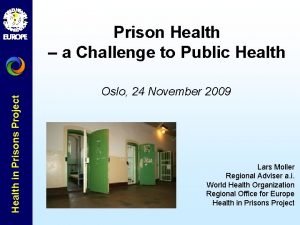Prison Health in Prisons Project WHO Regional Office















- Slides: 15

Prison Health in Prisons Project WHO Regional Office for Europe Riga 29 April 2008 Dr Lars Moller, Ph. D World Health Organization Regional Office for Europe

Health in Prisons Project WHO Regional Offices PAHO EURO AFRO EMRO SEARO WPRO Americas, Europe, Africa, Eastern Mediterranean, South East Asia, Western Pacific

Member States involved Ø 14 from West Europe: Health in Prisons Project • Austria, Belgium, Finland, France, Greece, Iceland, Ireland, Malta, Netherlands, Norway, Portugal, Spain, Switzerland, United Kingdom (England, Wales and Scotland Ø 13 from Central Europe: • Albania, Croatia, Czech Republic, Estonia, Hungary, Kosovo (observer), Lithuania, Latvia, Moldova, Poland, Romania, Serbia, Slovakia, Slovenia Ø 9 from East Europe: • Azerbaijan, Belarus, Georgia, Kazakhstan, Kyrgyzstan, Russian Federation, Tajikistan, Ukraine, Uzbekistan

International organizations involved Health in Prisons Project • • • American Public Health Association Pompidou Group, Council of Europe AIDS Foundation East-West WHO Collaborating Centre for Promoting Prison Health, Department of Health, England Wales International Centre for Prison Studies, Kings College, London International Committee of the Red Cross Cranstoun Drug Services European Monitoring Centre for Drugs and Drug Addiction United Nations Office on Drugs and Crime KNCV Tuberculosis Foundation Sainsbury Centre for Mental Health, United Kingdom The Prison Health Expert Group of The Northern Dimension Partnership in Public Health and Social Well-being

Prison population Health in Prisons Project Source: International Centre for Prison Studies

Health in Prisons Project HIV prevalence (%) in selected countries

Health in Prisons Project New cases of HIV 26% 12% 16% 32%

Health in Prisons Project Prisons are a breeding ground for HIV/AIDS epidemics, because: • Unprotected sexual relations: voluntary (circumstances), prostitution, rapes • Injection of drugs in the absence of sterile syringes • Tattooing, piercing, scarifications, brother blood sharing rituals • Accidental punctures with infected needles: searches in the cells • Safety of medical equipment (dental, medical, gynecological) • Fights • Transmission from mother to child • Sharing other injection equipment (water, spoons, etc. ) and razors, toothbrushes: hepatitis C & B

Health in Prisons Project HIV prevalence in Spanish prisons

New TB cases in prisons; EUR, 2004 § 37/52 (71%) countries reported to WHO-EURO on Health in Prisons Project new TB cases by penal and civilian system

Health in Prisons Project New TB cases in prisons; EEUR+, 2004

Health in Prisons Project Mental Health Problems • Of the two million prisoners in Europe, at least 400, 000 suffer from a significant mental disorder, and a larger number suffers from common mental health problems such as depression and anxiety. • There is often co-morbidity (dual diagnosis) with conditions such as personality disorder, alcoholism and drug dependence. • Overall the percentage of prisoners who suffer from a mental health problem and/or a drug dependence has been estimated to 60 -65%. • There is evidence that the most common form of mental health problem in prisons is personality disorder; a substantial part of the remaining prison population suffers from psychosis-related problems. • The lifetime prevalence of psychiatric co-morbidity among drug users in prison is 2 -3 times higher than in the general population.

Health in Prisons Project The WHO Health in Prisons Project Actual activities • Best Practice award • Prison Health Database • Guide on prison health • Status Paper on Prisons and Tuberculosis • Prisons and Mental Health • Prisons and Women • Country work


Web site: Health in Prisons Project http//: www. euro. who. int/prisons Contact Lars Moller: lmo@euro. who. int
 Health in prisons project
Health in prisons project Criminology unit 4 crime and punishment
Criminology unit 4 crime and punishment Hobbs and holt token economy
Hobbs and holt token economy San quentin famous inmates
San quentin famous inmates Esol prisons
Esol prisons Va seattle regional office
Va seattle regional office Whole foods midwest regional office
Whole foods midwest regional office Va regional office indianapolis
Va regional office indianapolis Niosh and dosh
Niosh and dosh Designated regional office of utiitsl
Designated regional office of utiitsl Office of regional operations
Office of regional operations Southern plains regional office
Southern plains regional office Regional center for border health
Regional center for border health Yuma territorial prison dark cell
Yuma territorial prison dark cell Sollentuna prison sweden
Sollentuna prison sweden Where is enfield prison farm said to be in chapter 23
Where is enfield prison farm said to be in chapter 23



























